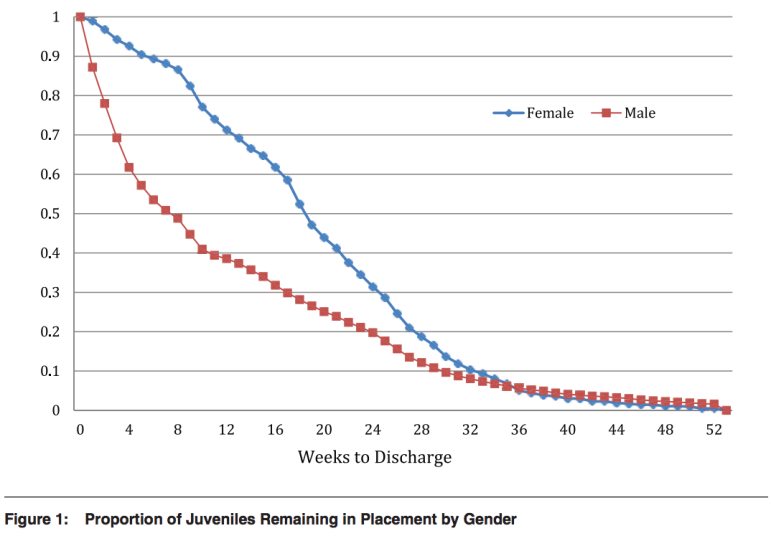
University of Texas
A chart from the report "The Influence of Gender and Traumatic Experiences on Length of Time Served in Juvenile Justice Settings" shows the difference gender makes in discharge time.
Girls serve longer sentences than boys in the Texas juvenile justice system, and for less serious offenses, according to a new study from the University of Texas at Austin.
Researchers studied 5,019 juveniles in three large, urban Texas counties over two years, finding that a female’s likelihood of remaining in confinement was 12.5 percent greater than that of a male.
Females were held longer for less serious offenses, the study found. They were released at a much slower pace than their male counterparts for “status offenses,” such as running away from home or skipping school, and spent an average of five days longer in pretrial detention for less serious offenses than male counterparts.
Girls in the juvenile justice system are also more likely to have a mental health issue and to have experienced trauma prior to incarceration, the study said.
Lead researcher Erin Espinosa said trauma might influence the longer confinements.
Certain aspects of detention, such as a door slamming or footsteps coming down the hall, can trigger girls who have experienced sexual abuse or assault to act in self-defense, Espinosa said, leading to new charges and a longer stay.
In a fight or flight scenario, girls in detention don’t have an opportunity to flee, so they fight, she said.
[Related: When We Fail To Ask Why: Sexually Abused Girls Funneled into Juvenile Justice System]
Advocates called for better trauma-informed therapies within detention facilities, and more community-based programming outside them to reduce the time girls spend locked up.
Girls “end up languishing in these facilities that are meant to help treat their underlying issues … yet these facilities don’t have sufficient programming to support their recovery,” said Elizabeth Henneke, policy attorney with the Texas Criminal Justice Coalition.
There is a need for “an investment in community programming specifically directed to girls and youth who are struggling with issues that can be best resolved in the community rather than in a facility,” she said.
Lisa Pilnik, deputy executive director of Coalition for Juvenile Justice, said locking girls up for status offenses is a misguided approach to protecting them.
“I think the best solution is for most of these kids not to be in a facility in the first place — to be getting trauma-responsive services in their communities,” she said.
Kids who do need to be detained need trauma-informed and gender-responsive programming, she said.
A 2015 report from the Council of State Governments found that juveniles in community-based supervision programs were less likely to reoffend than those in confinement.
“If the system is designed to be rehabilitative in nature … then what are we really achieving by keeping them locked up just because they’re girls?” Espinosa said.
More related articles:
Girls in Justice System Often Traumatized Victims of Abuse
California Mentorship Program Offers Comfort to Sexually Exploited Young Women
Report: Girls Face ‘Sex-Abuse-To-Prison Pipeline’
Women’s Center Works to Lower Recidivism Rates With ‘Immersion in Sisterhood’
Thanks guys for what you do…
The information in your articles are rich to communities that are forced to deal with issues mentioned,without resources,without money, without grants, etc. so from the thousands of agencies and community organizations, thank you!